u1-u3英语国家概况教案
- 格式:ppt
- 大小:118.00 KB
- 文档页数:24
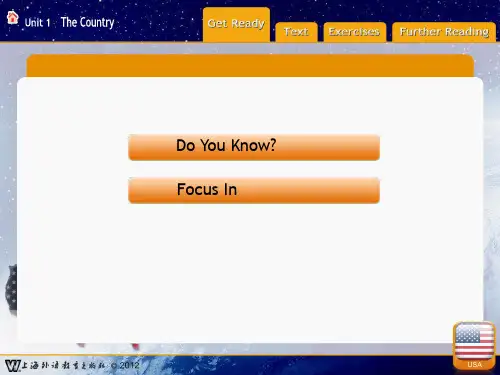
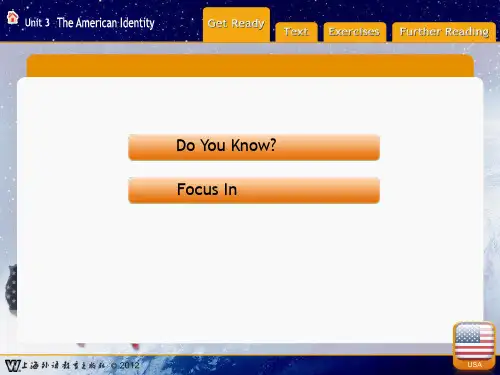
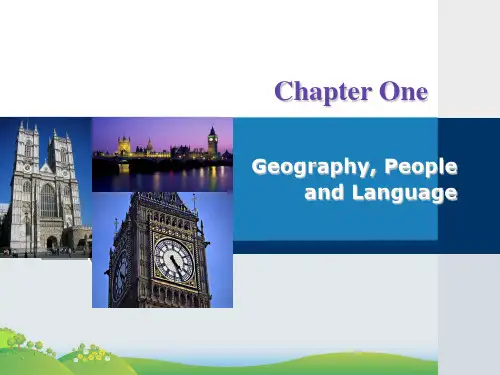
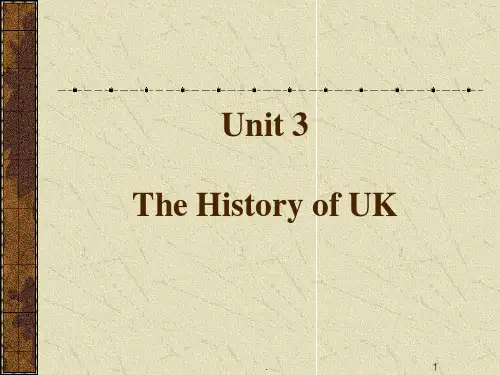
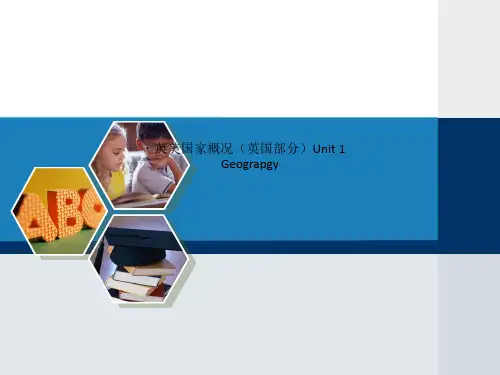
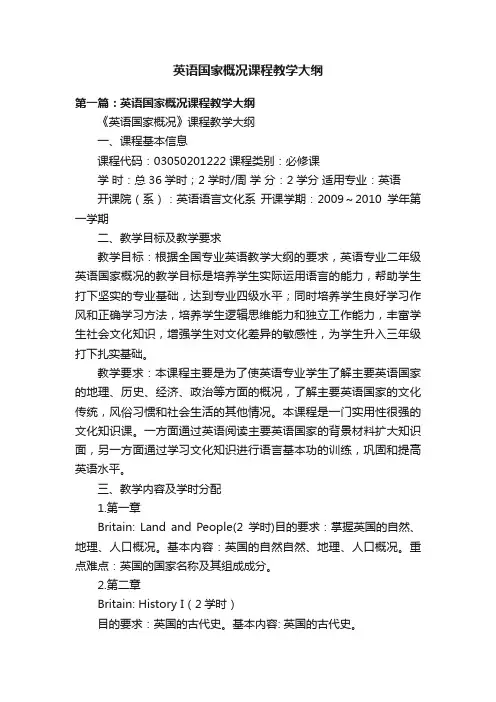
英语国家概况课程教学大纲第一篇:英语国家概况课程教学大纲《英语国家概况》课程教学大纲一、课程基本信息课程代码:03050201222 课程类别:必修课学时:总36学时;2学时/周学分:2学分适用专业:英语开课院(系):英语语言文化系开课学期:2009~2010学年第一学期二、教学目标及教学要求教学目标:根据全国专业英语教学大纲的要求,英语专业二年级英语国家概况的教学目标是培养学生实际运用语言的能力,帮助学生打下坚实的专业基础,达到专业四级水平;同时培养学生良好学习作风和正确学习方法,培养学生逻辑思维能力和独立工作能力,丰富学生社会文化知识,增强学生对文化差异的敏感性,为学生升入三年级打下扎实基础。
教学要求:本课程主要是为了使英语专业学生了解主要英语国家的地理、历史、经济、政治等方面的概况,了解主要英语国家的文化传统,风俗习惯和社会生活的其他情况。
本课程是一门实用性很强的文化知识课。
一方面通过英语阅读主要英语国家的背景材料扩大知识面,另一方面通过学习文化知识进行语言基本功的训练,巩固和提高英语水平。
三、教学内容及学时分配1.第一章Britain: Land and People(2学时)目的要求:掌握英国的自然、地理、人口概况。
基本内容:英国的自然自然、地理、人口概况。
重点难点:英国的国家名称及其组成成分。
2.第二章Britain: History I(2学时)目的要求:英国的古代史。
基本内容: 英国的古代史。
重点难点:英国历史上主要的入侵者,如:盎格鲁·萨克逊人;诺曼征服及其影响。
3.第三章Britain: History II(2学时)目的要求:英国的形成。
基本内容: 英国的形成。
重点难点:英国历史上的大宪章,百年战争,及其黑死病等重要历史事件。
4.第四章Britain: History III(2学时)目的要求:英国的近代史。
基本内容:英国的近代史。
重点难点:英国宗教改革,文艺复兴,英国内战,光荣革命。
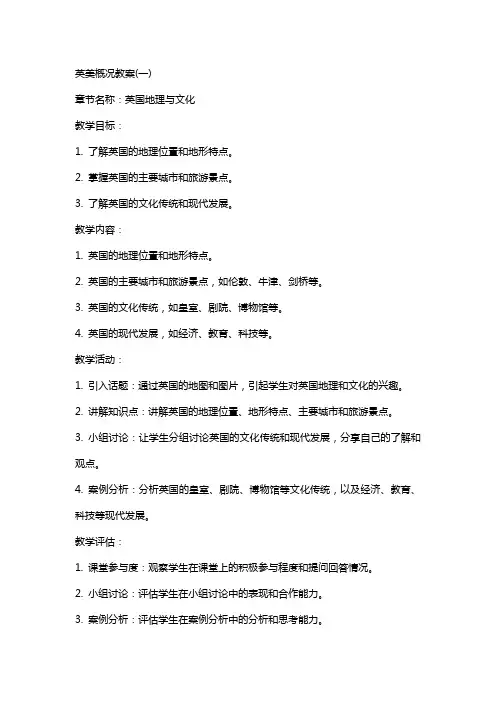
章节名称:英国地理与文化教学目标:1. 了解英国的地理位置和地形特点。
2. 掌握英国的主要城市和旅游景点。
3. 了解英国的文化传统和现代发展。
教学内容:1. 英国的地理位置和地形特点。
2. 英国的主要城市和旅游景点,如伦敦、牛津、剑桥等。
3. 英国的文化传统,如皇室、剧院、博物馆等。
4. 英国的现代发展,如经济、教育、科技等。
教学活动:1. 引入话题:通过英国的地图和图片,引起学生对英国地理和文化的兴趣。
2. 讲解知识点:讲解英国的地理位置、地形特点、主要城市和旅游景点。
3. 小组讨论:让学生分组讨论英国的文化传统和现代发展,分享自己的了解和观点。
4. 案例分析:分析英国的皇室、剧院、博物馆等文化传统,以及经济、教育、科技等现代发展。
教学评估:1. 课堂参与度:观察学生在课堂上的积极参与程度和提问回答情况。
2. 小组讨论:评估学生在小组讨论中的表现和合作能力。
3. 案例分析:评估学生在案例分析中的分析和思考能力。
章节名称:美国地理与文化教学目标:1. 了解美国的地理位置和地形特点。
2. 掌握美国的主要城市和旅游景点。
3. 了解美国的文化传统和现代发展。
教学内容:1. 美国的地理位置和地形特点。
2. 美国的主要城市和旅游景点,如纽约、华盛顿、旧金山等。
3. 美国的文化传统,如多元文化、宗教、节日等。
4. 美国的现代发展,如经济、教育、科技等。
教学活动:1. 引入话题:通过美国的地图和图片,引起学生对美国地理和文化的兴趣。
2. 讲解知识点:讲解美国的地理位置、地形特点、主要城市和旅游景点。
3. 小组讨论:让学生分组讨论美国的文化传统和现代发展,分享自己的了解和观点。
4. 案例分析:分析美国的多元文化、宗教、节日等文化传统,以及经济、教育、科技等现代发展。
教学评估:1. 课堂参与度:观察学生在课堂上的积极参与程度和提问回答情况。
2. 小组讨论:评估学生在小组讨论中的表现和合作能力。
3. 案例分析:评估学生在案例分析中的分析和思考能力。
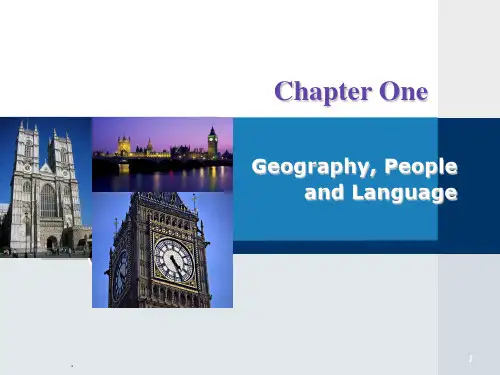
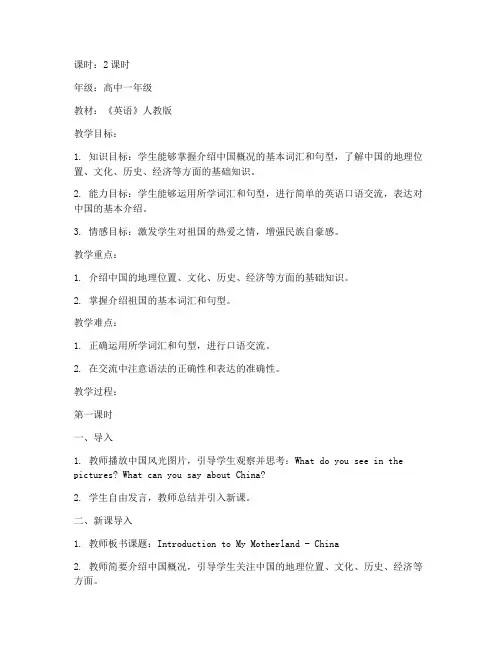
课时:2课时年级:高中一年级教材:《英语》人教版教学目标:1. 知识目标:学生能够掌握介绍中国概况的基本词汇和句型,了解中国的地理位置、文化、历史、经济等方面的基础知识。
2. 能力目标:学生能够运用所学词汇和句型,进行简单的英语口语交流,表达对中国的基本介绍。
3. 情感目标:激发学生对祖国的热爱之情,增强民族自豪感。
教学重点:1. 介绍中国的地理位置、文化、历史、经济等方面的基础知识。
2. 掌握介绍祖国的基本词汇和句型。
教学难点:1. 正确运用所学词汇和句型,进行口语交流。
2. 在交流中注意语法的正确性和表达的准确性。
教学过程:第一课时一、导入1. 教师播放中国风光图片,引导学生观察并思考:What do you see in the pictures? What can you say about China?2. 学生自由发言,教师总结并引入新课。
二、新课导入1. 教师板书课题:Introduction to My Motherland - China2. 教师简要介绍中国概况,引导学生关注中国的地理位置、文化、历史、经济等方面。
三、词汇教学1. 教师呈现以下词汇:geography, culture, history, economy, capital, language, people, etc.2. 学生跟读并模仿发音,教师纠正发音。
3. 学生分组进行词汇接龙游戏,巩固所学词汇。
四、句型教学1. 教师呈现以下句型:- What's the capital of China?- The capital of China is Beijing.- China has a long history.- China is a developing country.2. 学生跟读并模仿句型,教师纠正发音和语法。
3. 学生进行角色扮演,运用所学句型进行对话。
五、小组活动1. 学生分组,每组选择一个主题,如:Cultural Characteristics, Historical Landmarks, Economic Development, etc.2. 学生利用所学词汇和句型,进行小组讨论,制作PPT。

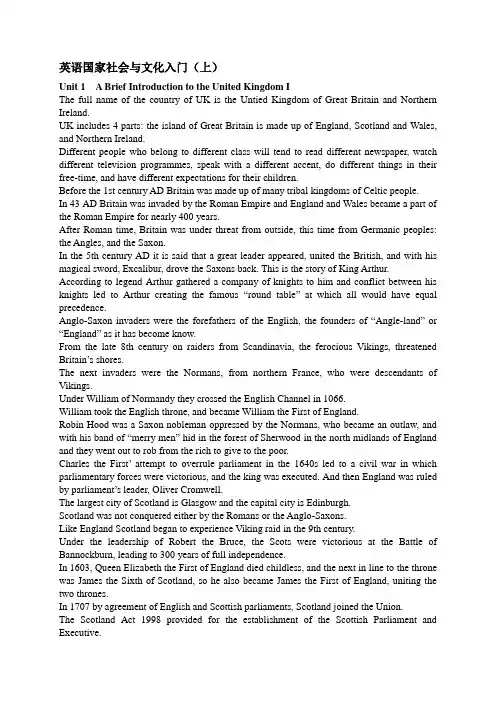
英语国家社会与文化入门(上)Unit 1 A Brief Introduction to the United Kingdom IThe full name of the country of UK is the Untied Kingdom of Great Britain and Northern Ireland.UK includes 4 parts: the island of Great Britain is made up of England, Scotland and Wales, and Northern Ireland.Different people who belong to different class will tend to read different newspaper, watch different television programmes, speak with a different accent, do different things in their free-time, and have different expectations for their children.Before the 1st century AD Britain was made up of many tribal kingdoms of Celtic people.In 43 AD Britain was invaded by the Roman Empire and England and Wales became a part of the Roman Empire for nearly 400 years.After Roman time, Britain was under threat from outside, this time from Germanic peoples: the Angles, and the Saxon.In the 5th century AD it is said that a great leader appeared, united the British, and with his magical sword, Excalibur, drove the Saxons back. This is the story of King Arthur. According to legend Arthur gathered a company of knights to him and conflict between his knights led to Arthur creating the famous ―round table‖at which all would have equal precedence.Anglo-Saxon invaders were the forefathers of the English, the founders of ―Angle-land‖ or ―England‖ as it has become know.From the late 8th century on raiders from Scandinavia, the ferocious Vikings, threatened Britain‘s shores.The next invaders were the Normans, from northern France, who were descendants of Vikings.Under William of Normandy they crossed the English Channel in 1066.William took the English throne, and became William the First of England.Robin Hood was a Saxon nobleman oppressed by the Normans, who became an outlaw, and with his band of ―merry men‖ hid in the forest of Sherwood in the north midlands of England and they went out to rob from the rich to give to the poor.Charles the First‘attempt to overrule parliament in the 1640s led to a civil war in which parliamentary forces were victorious, and the king was executed. And then England was ruled by parliament‘s leader, Oliver Cromwell.The largest city of Scotland is Glasgow and the capital city is Edinburgh.Scotland was not conquered either by the Romans or the Anglo-Saxons.Like England Scotland began to experience Viking raid in the 9th century.Under the leadership of Robert the Bruce, the Scots were victorious at the Battle of Bannockburn, leading to 300 years of full independence.In 1603, Queen Elizabeth the First of England died childless, and the next in line to the throne was James the Sixth of Scotland, so he also became James the First of England, uniting the two thrones.In 1707 by agreement of English and Scottish parliaments, Scotland joined the Union.The Scotland Act 1998 provided for the establishment of the Scottish Parliament and Executive.Scottish writes have given the world such well-known work as Walter Scott‘s romances of highland Scotland and ―Auld Lang Syne‖ (by Robert Burns)The capital city of Wales is Cardiff.Unit 2 A Brief Introduction to the United Kingdom IIThe capital city of Northern Ireland is Belfast.The most famous landmark of Northern Ireland is the ―Giant‘s causeway‖, a rocky promontory made up of black hexagonal columns.From the time of Queen Elizabeth I the new settlers, loyal to the British crown and Protestant in religious persuasion, were granted land, position, and privileges which had been systematically take away from the indigenous, Roman Catholic population.―Great hatred, little room‖ was the way the modern poet W. B. Yeats described the situation. Until 1921 the full name of the UK was ―The United Kingdom of Great Britain and Ireland‖, not only ―Northern Ireland‖, because the whole island of Ireland was politically integrated with Great Britain.The Easter Rising of 1916 was the most spectacular event, in which the rebels took over Dublin‘s Post Office, forcing the British to retake it by military means.In 1919 a group calling itself the IRA (Irish Republican Army) expanded the fighting.In the end the conflict became too great to ignore, and as the Sinn Fein party, who were supporters of the Irish terrorists, gained most of the Irish seats in the British parliament, Irish independence became inevitable.In 1921 the southern 26 counties formed an independent ―free state‖, while the 6 north-eastern counties remained a part the UK.In 1969, the first British soldiers were seen on Northern Irish streets.The official IRA thought enough progress had been made that they could concentrate on a political process, and run candidates for elections, but a strong faction felt that armed force was the only way to get the British out, and separated from the officials, calling themselves the ―Provisional IRA‖.In 1971 the Northern Irish government took the desperate step of imprisoning terrorist suspects from both sides without trial, a policy known as ―internment‖, which targeted primarily Catholic men in the North.In 1972 468 people were killed in Northern Ireland and that day has now been mythologiesed as ―Bloody Sunday‖, an important symbol of British oppression.In 1973, an agreement was reached between the main political parties in Northern Ireland, and importantly, the British and Irish governments, which led to a new form for the Northern Irish Parliament, with a Power-Sharing mechanism.The Sinn Fein party spoke of a twin campaign for union with Ireland, both political and military, which they called the policy of ―The Bullet and the Ballot Box‖.As a result of multi-party negotiations, aided this time by the intervention of the United States Senator George Mitchell, the Good Friday Agreement known also the Belfast Agreement, emerged on 10 April 1998.Unit 3 The Government of the United KingdomBritain is arguably the oldest representative democracy in the world, with roots that can be traced over a thousand years.The oldest institution of government is the Monarchy.The power of the monarchy was largely derived from the ancient doctrine of the ―divine right of kings‖The opposition was so powerful the king finally granted a gang of feudal barons and the Church a charter of liberty and political rights, still know by its medieval Latin name of Magna Carta, which is still regarded as Britain‘s key expression of the rights of citizens against the Crown.The civil war which brought the Roundheads to power in the 17th century was rooted in a dispute over the power of the king vis-à-vis Parliament.In 1689 Parliament passed the Bill of Rights which ensured that the King would never be able to ignore Parliament.In 1832, when a system for choosing the House of Commons by popular election replaced the monarch‘s job of appointing representatives, the modern political system was born.The party with the most supporters in the Commons forms the government, and by tradition, the leader of that party becomes Prime Minister.Britain is both a parliamentary democracy and a constitutional monarchy.British governance today is based upon the terms and conditions of the constitution.Israel and Britain are the only two countries without written constitutions of the sort which most countries have.The foundations of the British state are laid out in statute law, that is, laws passed by Parliament; the common laws, which are laws which have been established through common practice in the courts, not because Parliament has written them; and conventions, which are rules and practices which do not exist legally, but are nevertheless regarded as vital to the workings of government.Parliament is supreme in the British state because it alone has the power to change the terms of the Constitution.Strictly speaking, the Parliament today consists of the Queen, the House of Lords and the House of Commons.The role of the monarchy today is primarily to symbolize the tradition and unity of the British state.There are 724 Lords and 646 Members of Parliament in the House of Commons.Unit 4 Politics, Class and RaceIn 1928 it reached the current level of about 99% can vote (those excluded are Lords, certain categories of convicted criminals, the legally insane, and resident foreign citizens –except UK resident citizens of the Irish Republic)After a government has been in power for 5 years it has to resign and hold a ―general election‖, in which all British adults are given the chance to vote again for their constituency‘s MP.Anyone who is eligible to vote can stand as an MP. It is necessary only to make a deposit of 500 pounds which is lost if the candidate does not receive at least 5% of the vote.There are three major national parties: The Conservative party and the Labour party are the two biggest, and any general election is really about which of those two is going to govern. But there is a third important party, the Liberal Democrats.The Labour party is the newest of these three, created by the growing trade union movementat the end of the nineteenth century.The Conservative party is the party that spend most time in power.The Liberal Democrats are the third biggest party, and to some extent may be seen as a party of the ―middle‖, occupying the ideological ground between the two main parties.Margaret Thatcher is the UK‘s first woman Prime Minister.The car-worker probably reads a paper like The Sun: a newspaper with little heard news and more about TV soap operas, the Royal family, and sport. The university teacher might read The Guardian: a larger newspaper with longer stories, covering national and international news, ―high‖ culture such as theatre and literature, and so on.Unit 5 The UK EconomyThe UK is now the world‘s sixth largest economy.The UK is not only a member of the G7, G8, G20 major economies, but also a member of the World Trade Organization.Firstly, the country had gone heavily into debt in order to finance the war, selling many of its accumulated overseas assets, and borrowing large amounts from the United States and Canada.Secondly, the ear of empire was over. India, popularly known as ―The Jewel in the Crown‖ of the British Empire, gained its independence in 1947.Thirdly, despite the relatively rapid and trouble-free process of decolonization, Britain has still forced to maintain a substantial and expensive military presence in many overseas locations until the process was completed.Fourthly, although Britain was quite badly damaged by German bombing during the war, its industry survived comparatively unaffected. This failure to invest sufficiently in industry also reflects a long-standing and continuing problem in the UK economy.National economies can be broken down into three main areas: ―primary‖ industries, such as agriculture, fishing, and mining; ―secondary‖ industries, which manufacture complex goods from those primary products; and tertiary industries, often described as services, such as banking, insurance, tourism, and the selling of goods.Britain‘s agricultural sector is small but efficient, producing 58% of the UK‘s food needs with only 2% of its workforce.Scottish ports land the majority of the fish caught.Three of the biggest ten companies in Britain are to be found in the energy sector: Shell, British Petroleum (BP), and British Gas.The World‘s largest mining company, RTZ, is a UK company which operates mines all over the world.The British company Glaxo-Wellcome is the biggest drug company in the world.70% of the UK‘s workforce are employed in the service sector.London is one of the top three financial centres in the world. It has the greatest concentration of foreign banks in the world, accounts for 20% of all international bank-loans, and is the world‘s largest foreign exchange market. As well as banking, dealing in commodities and insurance are important processes in ―The City‖—the name given to the historic area at the centre of London where all this business is concentrated, at the heart of which is London Stock Exchange, one of the business share-dealing centres in the world.Aerospace is one of the UK‘s highest value adding manufacturing sectors.Unit 6 British LiteratureThe major literature competition is the annual Booker Prize.Much early British writing was concerned with Christianity: Anglo-Saxons produced beautifully illustrated versions of the Bible: the most famous of these is the Book of Kells. One of the oldest of these early ―Old English‖ litrary works is long poem from Anglo-Saxon times called Beowulf.One work from Norman Conquest times often studied today by middle school and college students is The Canterbury Tales by Geoffrey Chaucer, who was the first court poet to write in English.There was a general flowering of cultural and intellectual life in Europe during the 15th and 16th century which is known as ―The Renaissance‖.Christopher Marlowe‘s most famous play is The Tragical History of Doctor Faustus, the story of a man who sold his soul to the devil in return for power.William Shakespeare is probably the best-known literary figure in the world.The tragedies include Romeo and Juliet, Hamlet, Othello, King Lear, and Macbeth.Among the comedies are The Taming of the Shrew, A Midsummer Night‘s Dream, Twelfth Night, and The Tempest.A permanent monument of English literature style commemorates James‘s name. He ordered the translation of the Holy Scriptures known as the King James Bible(1611).The Essays of Frances Bacon made popular in English a literary form widely practiced afterward.The literary giant of the 17th century, John Milton was much bound up in Puritan Revolution. The most famous pamphlets is Areopagitica. During his retirement from public life he produced his masterpieces: Paradise Lost, its sequel, Paradise Regained, and the poetic tragedy Samson Agonistes.Johnthan Swift‘s name is linked with the fanciful account of four voyages known to us as Guliver‘s Travels.Scotland produced a much-loved poet, Robert Burns, who wrote in Scottish dialect.Daniel Defoe ‗s first and greatest novel appeared in 1719, which was Robinson Crusoe, the most famous tale of shipwreck and solitary survival in all literature.Two poets offered what had been called romantic poetry‘s ―Declaration of Independence.‖This was a volume of poems called Lyrical Ballads, written by William Wordsworth and Samuel Taylor Coleridge.George Gordon, Lord Byron‘s large body of work includes the partly autobiographical Childe Harold‘s Pilgrimage. Don Juan owed its title.John Keats‘s art is nowhere greater than in the two pomes ―Ode on a Grecian Urn‖ and ‖Ode to a Nightingale.‖Percy Bysshe Shelley‘s writing has a wide range. The lovely musical quality of his work appears in the fine verses of ―Ode to the West Wind‖ and ―To a Skylark‖The spirit of Romanticism also occurred in the novel, notably in Mary Shelley‘s (the poet Shelly‘s wife) Frankenstein, the story of science gone wrong through the disastrous consequences of an arrogant scientist‘s attempts to create life.Most of Sir Walter Scott‘s themes came from medieval and Scottish history and he wrote a number of romantic novels.Jane Austen, who excelled at this form of writing, is indeed one of the greatest of all Englishnovelists. A delightful, almost flawless stylist, she has devoted admirers of her Sense and Sensibility, Pride and Prejudice, and Emma, among other works.Perhaps the most famous literary family in British history are the Bronte sisters, and they too were influenced by the Romantic movement. Charlotte Bronte‘s Jane Eyre and Emily‘s Wuthering Heights are the most successful.Charles Dickens produced Pickwick Papers, Oliver Twist, David Copperfield and Great Expectations.Later in the 19th century Robert Louis Stevenson also wrote Scottish historical romances, The Adventures in Treasure Island and Kidnapped thrill readers young and old. His most famous short novel was The strange Case of Doctor Jekyll and Mr. Hyde.Among Thomas Hardy‘s better-known novels are The Return of the Native, Tess of the D‘urbervilles, and Jude the Obscure.20th century literature can be broadly divided into two stylistic periods: Modernism, and Postmodernism.One of the most famous of English modernist writers is Joseph Conrad, whose most famous novel is The Heart of Darkness.Virginia Woolf is another writer associated with Modernism, and one of the most famous writers of the century. Mrs. Dalloway, To the Lighthouse, and Orlando are among her best-known books.D.H. Lawrence wrote Sons and Lovers.Unit 7 British Education SystemMany people think school is just about teaching children what are often called ―the three Rs‖–―reading, riting and rithmetic‖. But the purpose of the British education system is also to socialize children.The school (or college) tie is a clear marker of social class.Education in the UK is compulsory. Children are legally obliged to attend school from the age of 5 (4 in Northern Ireland) to 16.State schools are funded by local and central government. The government also sometimes assists schools established by religious groups.In the private sector there are independent schools which are commonly, but confusingly, called public schools. Independent schools receive their funding through the private sector and through tuition rates, with some government assistance.Between the ages of 5 to 11, pupils mainly attend state sector primary schools.From the age of 11 up to around the age of 19, students attend secondary schools.General Certificate of Secondary Education are the main means of assessing pupils‘ progress in their final 2 years of compulsory education.Other pupils who decide not to go to university may choose to take vocational training.So far, the UK has only one privately funded university, the University of Buckingham. Oxford and Cambridge date from the 12th and 13 centuries.The Open University offers a non-traditional route for people to take university level courses and receive a university degree.Unit 8 The British MediaThe observer, which is still published every Sunday, first appeared in 1791, making it theworld‘s oldest Sunday newspaper, while The Times, which began publishing in 1785, is the United Kingdom‘s oldest daily newspaper.This watchdog function, keeping an eye on the government, is one of the reasons why a free press is considered so important to the functioning of parliamentary democracy.The British media all must follow the Advertising Code which ensure that advertisements are legal, decent, honest and truthful; have a sense of responsibility for consumer and society; and respect the principles of fair competition.Until the 1980s, almost all the national newspapers had their headquarters on or around Fleet Street in London, and sometimes you will hear newspaper culture referred to still as ―Fleet Street‖, or even, sometimes, the Street of Shame, reflecting the birth of scandals which take place.While officially speaking the British press is ―free‖ from government control and censorship and can print what it likes, there are limits to what will appear in the daily paper.The oldest and most popular soap, which began in the 1960s, is Coronation Street.The British Broadcasting Corporation –more familiarly known as the BBC or even ―the Beeb‖– us Britain‘s main public service broadcaster.The BBC is funded by license fees and viewers must buy a license each year for their TV set. Unit 9 Sports, Holidays and Festivals in Britain―Football hooligans‖, supporters of rival teams, sometimes clash before, during and after matches and occasionally run riot through the town, breaking windows and beating each other up.Wimbledon, actually a London suburb, is where the world‘s best players gather to compete on grass courts. It is one of the major events of the British sporting calendar and probably the most famous tennis event in the world.Cricket was one of the very first team sports in Britain to have organized rules and to be played according to the same rules nationally.The game of golf was invented by the Scottish.The true sport of British Kings and Queens is not skiing or golfing, but horse racing.There are two kinds of horse racing: flat racing, where horses and riders compete on a flat, oval track; and steeple-chasing, which is racing either across the countryside, or around a course designed to represent the obstacles you might encounter in the countryside. Christmas, December 25th, is the biggest and best loved British holiday.There are three Christmas traditions which are particularly British: one is the Christmas Pantomime, a comical musical play.Another British Christmas tradition is to hear the Queen give her Christmas message to her realm over the television and radio.A third British tradition, which is also celebrated in countries with British heritages, is Boxing Day, which falls on the day after Christmas.For church goers it is Easter, not Christmas, which is the most important Christian festival. One of Britain‘s most impressive and colourful festival happens on the second Saturday in June when the Queen‘s Birthday is officially celebrated by ―Trooping the Colour‖around Buckingham Palace in London.The UK, unlike most countries, does not have a ―national day‖.One truly English holiday is Bonfire Night –sometimes called Guy Fawkes Night –celebrated in the early autumn.The Twelfth is the high point of what is known as the Marching Season, when Protestant ―Orangemen‖ take to the streets wearing their traditional unifors of bowler hats, black suits and orange sashes, marching through the streets sing, banging durms and playing in marching bands.Northern Irish Catholics celebrate the birthday of the patron saint of Ireland, St Patrick, on March 17 each year.How Hogmanay is celebrated varies throughout Scotland, but one widely practiced is ―first footing‖.Each year Scottish people all over the world celebrate their most beloved national poet, Robert Burns, by holding a Burns Supper on the evening of his birthday.Halloween is a Scottish festival that comes from the great feast of the pagan Celts which marked the arrival of the winter half of the year.Wales has some of the oldest and richest literary, musical and poetic traditions in Europe.。